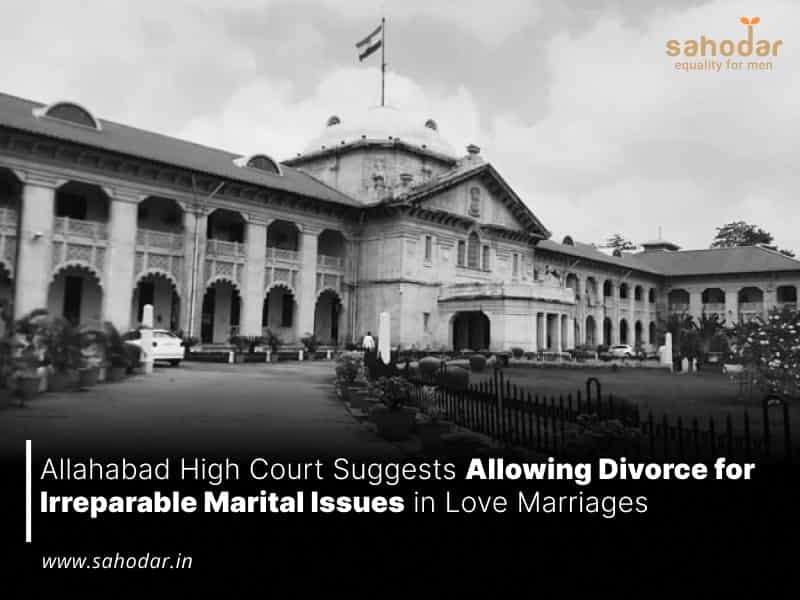The High Court directed the Union of India and the Law Commission to consider the demand for including irretrievable breakdown of marriage as a ground for divorce under the Hindu Marriage Act.
On Thursday, the Allahabad High Court rendered observations regarding love marriages, characterizing them as unions easily contracted, often culminating in matrimonial discord with comparable expediency.
Justices Vivek Kumar Birla and Donadi Ramesh, comprising the division bench, underscored the imperative of amending the grounds for divorce delineated within the Hindu Marriage Act to accommodate contemporary exigencies.
In particular, the Court implored the Union of India to contemplate revisions to the Hindu Marriage Act, informed by the pronouncements of the Supreme Court in 2006 advocating for the recognition of irretrievable breakdown of marriage as a valid basis for divorce.
Reflecting upon the inception of the Hindu Marriage Act in 1955, the Court discerned a palpable shift in societal mores regarding matrimonial bonds since its enactment, attributing such transformation to factors such as education, financial autonomy, the dissolution of caste barriers, modernization, and the pervasive influence of western cultural norms.
The Court underscored the evolving fabric of society towards heightened individualism, consequentially diminishing the reliance upon emotional support within marital relationships.
“Whether it is a love marriage or is an arranged marriage, all such factors do affect the relationship between the two. However, needless to say that to every action, there is equal reaction. Easily entered marriages like love marriages are also easily resulting in matrimonial dispute between the two. No matter, who is responsible for the same. The parties are not willing to continue such relationship or atleast one party starts living separately,” the Court remarked.
The judges remarked that these “facts” were evidently manifesting from their experiences in adjudicating such disputes.Top of Form
Easily entered marriages like love marriages are also easily resulting in matrimonial dispute.”“
Allahabad High Court
During the adjudication of an appeal brought forth by a doctor with an extensive service record in the Indian Army, the Court rendered these observations. The appeal contested the decision of the Family Court to deny the doctor’s petition for dissolution of marriage from his wife, also a senior medical practitioner.
The matrimonial union, being the second for both parties, was solemnized in 2007. Allegedly, six years preceding the husband’s application for divorce in 2015, the wife ceased cohabitation, citing allegations of cruelty.
The Family Court dismissed the husband’s petition, prompting recourse to the High Court in 2019. The wife, electing not to participate in the proceedings, was consequently dealt with ex parte.
The crux of the husband’s contention before the High Court centered on the assertion that the protracted separation from his wife constituted mental cruelty.
Upon careful consideration of the submissions, the Court expeditiously acknowledged the longstanding judicial recognition by the Supreme Court of irretrievable breakdown of marriage as a valid ground for divorce. Specifically, the Court cited the 2006 precedent of Naveen Kohli Vs. Neelu Kohli, wherein the apex court deliberated on the prospect of incorporating irretrievable breakdown of marriage as a legal basis for divorce.
Nevertheless, the High Court lamented the lack of progress in this regard, despite the passage of nearly two decades since the pronouncement of the apex court on this pivotal matter.
“On one hand, the law recognises desertion of a petitioner for a continuous period of not less than two years immediately preceding the presentation of the petition as one of the grounds for grant of divorce, whereas on the other hand, it is not understandable as to why the ground of irretrievable break down is not being recognized as one of the grounds, when the parties are living separately for so many years and in some cases, for decades together,” it added.
Additionally, the Court expressed that in numerous instances, the marital relationship between parties persists in name only.
The Court elaborated that due to this circumstance, the Supreme Court has consistently opined that the continuation of such impracticable marital bonds amounts to nothing short of mental cruelty inflicted upon the parties involved.
“To our mind, irretrievable break down is an assessment of circumstances prevailing in lives of the parties to the marriage and if proved, would amount to mental cruelty,” it said.
Regarding the current case, the Court remarked that the prolonged absence of the wife from her husband unequivocally indicates her lack of interest in sustaining the marital relationship.
In recognizing the irretrievable breakdown of the marriage, the Court concluded that the circumstances undeniably depict a scenario of ‘mental cruelty’ inflicted upon the husband, given that the marriage has become entirely untenable and emotionally defunct.
“On that note, divorce can be granted,” it said, while allowing the appeal and granting a decree of divorce in favour of the husband.
Concurrently, the Court ordered the Registrar (Compliance) to forward a copy of this judgment to the Secretary of the Ministry of Law and Justice, Department of Legal Affairs, Government of India, and to the Law Commission. This directive is intended to facilitate the review of the matter in accordance with the observations articulated by the apex court in the case of Naveen Kohli and pertinent jurisprudential precedents.

